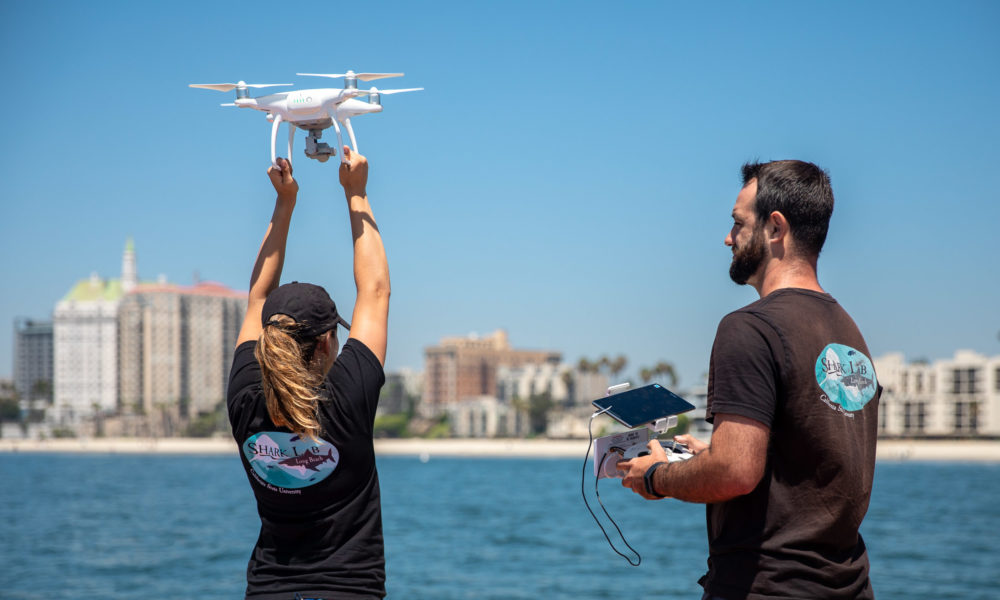Patrick Rex wasn’t always passionate about sharks, in fact, he grew up with a fear of the animal until his teenage years.
“I saw ‘Jaws’ when I was five or six and I became extremely scared of sharks,” he said. “It was an extreme phobia. I had to learn more about them so I started to read, and watch Shark Week to learn more about [sharks]. After I reached my teenage years, they became my passion.”
Rex, a Long Beach State graduate student, is now working with the CSULB Shark Lab and Fullerton College’s Drone Lab for his master’s research on Southern California marine recreation and the assessment of the white shark.
He received a degree in marine biology at the University of Hawai’i, where he volunteered at the shark lab during his first year. Rex started with groundwork such as cleaning tanks and chopping fish to feed the sharks.
After graduating, Rex got a job with a tuna fishery agency that serves as the “eyes and ears” of fishery regulatory agencies.
However, Rex soon realized that he wanted to go back to school to gather data and conduct his own research on one of his favorite marine animals: white sharks.
“A lot of what drove me here was the white shark research,” he said.
Jay Seidel, a journalism professor at Fullerton College who oversees the drone technology program, and Chris Lowe, Shark Lab director have been integral in the creation of the partnership.
“It’s a great collaboration that allows our students real work experience while providing data and helping the students in the Shark Lab expand their research,” Seidel said. “We just started getting the students in place and capturing the video footage. We’ve gone out to two beaches so far and plan on setting up weekly flights to various beaches up and down the coast.”
Seidel initiated the drone lab program at Fullerton College in 2019 and said that the collaboration with the Shark Lab is the first with another institution.
Lowe saw the potential in this partnership and took the opportunity as a “win-win” scenario.
“The goal is to educate the public about the rising white shark population,” Lowe said. “There are many questions about sharks that we don’t have answers for. We’re working closely with all the lifeguard agencies in California to provide them with scientific information and training.”
Rex is aiming to collect as much data and footage as possible to conclude his thesis.
“With one sweep of the drone, I can cover the entire shore area with all the people in it in one shot, and from there I can cover a lot of the ocean and look for sharks,” he said.
In the past, the shark lab would ask lifeguards and police helicopters to spot sharks for them, but the cost of doing so was too much, according to Rex.
“When drones came out, we essentially started using them,” he said. “The cost is way cheaper than, say, paying for helicopter’s gas and it was also easier for the lifeguards to use them. With drones, you are only limited by the time of the battery.”
The Shark Lab currently has one drone with 13 battery replacements that can last around 20 minutes at a time.
Rex said creating a “map” of the entire Southern California coast, from San Diego to Santa Barbara, is the end goal of the project.
Lowe and Rex commented on the possibility of people potentially using the data to track sharks and fish them illegally.
“We already have a problem with people illegally fishing white sharks,” Lowe said. “Our data isn’t the only source they are using to illegally hunt sharks so I don’t think that our data would help these people.”
Rex is still hopeful that the positive benefits will outweigh any potential negative side effects.
“The purpose of this research is to help people understand that sharks are not waiting for surfers, paddle-boarders or swimmers to bite them,” Lowe said. “People sometimes are closer to a shark than what they imagine, and sharks don’t even bother to get close to them either.”





Pingback: CSULB’s Shark Lab sees record-high number of white sharks off Southern California beaches - Daily Forty-Niner